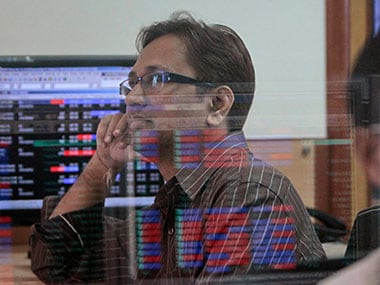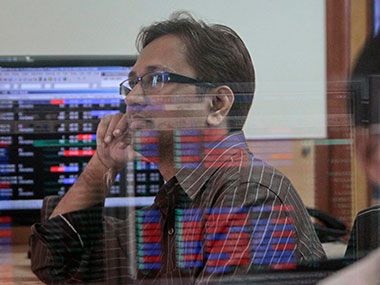Equity benchmarks Sensex and Nifty opened on a volatile note on Tuesday tracking losses in banking stocks as weak inflation numbers weighed on domestic investor sentiment. After opening nearly 100 points lower, the 30-share BSE index was trading 50.26 points or 0.12 percent lower at 41,809.43. Similarly, the broader NSE Nifty slipped 13.80 points or 0.11 percent to 12,315.75.
#CNBCTV18Market | Indices open flat but Sensex & Nifty stick around record levels; Wipro top gainer ahead of Q3 earnings expected today
— CNBC-TV18 (@CNBCTV18Live) January 14, 2020
For more LIVE updates, log on to https://t.co/7unDXZmmro pic.twitter.com/bLCoTZvQdV
HDFC twins, ICICI Bank, HUL, L&T, Ultratech Cement and ONGC were among the top losers in the Sensex pack, shedding up to 0.63 percent. On the other hand, Tata Steel, HCL Tech, M&M, TCS, and Asian Paints rose up to 1.04 percent, according to a PTI report.
#CNBCTV18Market | Yes Bank at the helm of #Nifty losers this morning pic.twitter.com/sLhWazJC7V
— CNBC-TV18 (@CNBCTV18Live) January 14, 2020
In the previous session, Sensex settled 259.97 points, or 0.62 percent, up at its new closing peak of 41,859.69. Likewise, the Nifty ended 72.75 points, or 0.59 percent, higher at 12,329.55—its fresh closing record. Meanwhile, on a net basis, foreign institutional investors bought equities worth Rs 68.24 crore, and domestic institutional investors purchased shares worth Rs 47.17 crore on Monday, data available with stock exchanges showed. [caption id=“attachment_5678251” align=“alignleft” width=“380”]  Representational image. Reuters.[/caption] According to traders, the market mood turned bearish after government data on Monday showed that retail inflation rose to about five-and-half year high of 7.35 percent in December 2019, surpassing the RBI’s comfort level, mainly due to spiraling prices of vegetables as onions were selling costlier. Spike in headline inflation is an “unwanted complication” in a slowing economy and will prevent the Reserve Bank from cutting rates, analysts said, warning of the “spectre of stagflation” that India risks getting into. Rupee appreciates The rupee appreciated by 8 paise to 70.78 against the US dollar in early trade on Tuesday as sign of easing tensions between the US and China strengthened investor sentiments.
#Rupee opens higher pic.twitter.com/PlLAVR2R1C
— CNBC-TV18 (@CNBCTV18Live) January 14, 2020
The United States on Monday removed the currency manipulator label it imposed on China last summer and forex traders believe it as a sign of easing tensions between the two economic powers after nearly two years of conflict. The US Treasury in its semi-annual report to Congress said that the yuan has strengthened and Beijing is no longer considered a currency manipulator, just days before US President Donald Trump is set to sign a “phase one” trade agreement with China. At the interbank foreign exchange, the rupee opened at 70.78 against the US dollar, registering a rise of 8 paise over its previous close. On Monday, the rupee had settled for the day at 70.86 against the US dollar. Traders said the appreciation in the rupee was largely on the back of positive global cues. “Over the summer, China took concrete steps to devalue its currency,” the yuan or renminbi (RMB), and those moves “left the RMB at its weakest level against the dollar in over 11 years,” Treasury said. Meanwhile, domestic bourses opened on a muted note on Tuesday with benchmark indices Sensex trading 16.01 points down at 41,843.68 and Nifty up 6.85 points at 12,336.40. The dollar index, which gauges the greenback’s strength against a basket of six currencies, rose by 0.04 percent to 97.38. Foreign institutional investors (FIIs) remained net buyers in the capital market, as they purchased shares worth Rs 68.24 crore on Monday, according to provisional exchange data. Brent crude futures, the global oil benchmark, rose 0.14 per cent to trade at USD 64.29 per barrel. The 10-year government bond yield was at 6.67 per cent in morning trade Yuan soars, stocks scale heights Asian shares hit a 7-month high, China’s yuan jumped and safe-harbor assets slipped on Tuesday, amid signs of goodwill between China and the United States, as the world’s two biggest economies prepared to sign a truce in their trade war. The US Treasury Department on Monday said China should no longer be designated a currency manipulator - a label it applied as the yuan dropped in August, according to Reuters. China, meanwhile, allowed the tightly managed currency to climb to its highest point since July, after fixing the yuan’s trading-band midpoint at its firmest in more than five months. The yuan sat 0.4 percent firmer at 6.8677 per dollar by mid-session. The moves come as a Chinese delegation arrived in Washington ahead of Wednesday’s signing of the Phase 1 trade agreement, seen as calming a dispute that has upended the world economy. MSCI’s broadest index of Asia-Pacific shares outside Japan hit its highest since June in morning trade, driving world stocks to a record high. Japan’s Nikkei added 0.7 percent and hit its highest point in a month. Hong Kong’s Hang Seng rose to its highest since May and Shanghai blue chips scaled heights not touched since January 2018, though both later pared gains. Australia’s S&P/ASX 200 rose 0.7 percent to a record intraday high. Gold fell and the safe-harbor Japanese yen dropped to a seven-month low. “There have been a number of false starts,” said Vishnu Varathan, head of economics at Mizuho Bank in Singapore. “The fact that this is really coming to the moment when the rubber hits the road is the most tangible evidence of traction in starting to resolve issues, that’s what’s driving optimism.” Chinese economic data showing rising exports and imports in December also put a floor under gains. Overnight Wall Street logged record closing highs, helped by sharp rises in technology stocks as investors bet firms such as Facebook Inc, Microsoft Corp and Apple Inc might have the most to gain from revived global growth. The S&P 500 rose 0.7 percent to a record closing high, while the Nasdaq Composite added 1% and also closed at a record peak. The Dow Jones Industrial Average rose 0.29 percent. With the text of the Sino-US deal yet to be finalised, some fretted the gains could leave stocks exposed should anything go awry, with modest volumes in equity markets hinting at caution. “The market appears to be fully pricing a signed agreement,” said CMC Markets’ chief strategist in Sydney, Michael McCarthy. “It’s buying the rumor, sell the fact… Even a delay could see an extremely negative reaction,” he said. United States Trade Representative Robert Lighthizer told Fox Business late on Monday that the Chinese translation of the deal’s text was almost done. “We’re going to make it public on Wednesday before the signing,” he said. Yen, gold slip In tandem with the rally, safe-harbor assets slid lower on Tuesday. Gold extended Monday’s fall to trade 0.6 percent weaker at $1538.76 per ounce. Oil nursed losses and yields on benchmark U.S. Treasuries rose as prices fell. Brent Crude was steady around $64.37 per barrel. Ten-year Treasury note yields rose to 1.8599 percent compared with the US close of 1.848 percent. In currency markets, the yen weakened past the 110 yen-per-dollar mark while the yuan’s strength helped lift trade-exposed currencies across Asia. Besides the trade deal, investors are also looking to US inflation data due later on Tuesday and the beginning of the fourth-quarter U.S. company results season. Big banks JPMorgan Chase & Co, Citigroup Inc and Wells Fargo & Co are due to report earnings before market open on Tuesday. --With inputs from agencies


)
)
)
)
)
)
)
)
)



